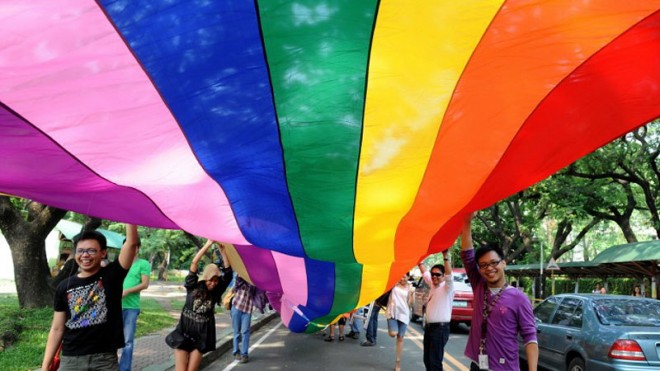
Filipino gays and lesbians march with placards on the University of the Philippines campus in Manila on June 28, 2011, as the world celebrate Lesbian, Gay, Bisexual and Transgender (LGBT) Pride. The LGBT group urged President Benigno Aquino to recognize and promote human rights for gays and lesbians. AFP FILE PHOTO
Passing the bill against discrimination based on sexual orientation and gender identity (Sogi) may prove to be a more daunting task than when Congress passed the controversial Reproductive Health (RH) law, one of its authors said Monday.
During the forum “The Cost of Exclusion” at the House of Representatives, Dinagat Rep. Kaka Bag-ao said Congress would find it a bigger challenge to lobby for the passage of the bill with the stiff opposition from the influential Catholic Church and other religious sects.
She said the position papers of the religious organizations were even harsher than those on the RH law, which seeks to institute reproductive health measures such as making contraceptives more accessible.
“I think the challenge for the anti-discrimination bill would be greater than that of the Responsible Parenthood law. Sa reaction lang na nakikita ko mula sa iba’t ibang faith-based organizations, mas malupit sila ngayong mag-comment kaysa dun sa Reproductive Health bill (Based on the reaction I have seen from faith-based organizations, they are harsher now than they were on the Reproductive Health bill),” said Bag-ao, who is an author of both controversial pieces of legislation.
READ: Accepted–but not quite: LGBT youth speak
Bag-ao held the forum to show that stigma and discrimination against the LGBTs also contribute to poverty and exclusion from development. Invited as resource speaker was Dr. Lee Badgett, who showed in her study that gender rights and economic development are interrelated.
She said based on a statistical analysis of 39 emerging economies in 2011, the GDP per capita and Human Development Index are higher in countries which are more LGBT-inclusive.
The economics professor from the University of Massachusetts said one right for LGBT is equivalent to a $320 increase in the gross domestic product (GDP) per capita representing three percent of GDP.
Badgett showed the study in illustrating that countries suffer from lower economic development because of homophobic policies that prevent LGBT from engaging in economic activity.
“As you increase the number of rights in the country, these have higher levels of GDP per capita. The countries that do better, that are more inclusive, have better economic development outcomes,” Badgett said.
Rep. Bag-ao said Badgett’s study affirms the need to pass the anti-discrimination bill not just for gender rights but for economic development, as well.
“Badgett’s study underscores the need to pass the anti-discrimination bill. Discrimination limits our full potential as a human being and a member of a family. It adversely affects the economic and social conditions of a country. LGBT inclusion also drives economic development,” Bag-ao said.
The House women and gender committee secretariat Beatriz Sanga said the anti-discrimination bill is reported out to the Committee on Rules for plenary schedule.
She urged solons to lobby for the bill to be calendared for plenary debate especially as members from the church have sent piles of position papers against the proposed measure.
Sanga said some co-authors had withdrawn from the bill because of church opposition.
“Our committee focused on the discrimination based on Sogi. And we really found it so difficult because in our culture, we are not all accepting (of the LGBT)… Sabi nga ng Church, God created Adam and Eve, not Adam and Steve,” Sanga said.
“We’re talking of all churches here against those pushing for this bill. If you see positions papers, there’s almost a mountain of it. Just lobby with your congressman so this bill can be deliberated in the plenary,” she added.
The proposed Anti-Sogi Discrimination Act seeks to penalize discriminatory practices on the basis of sexual orientation and gender identity. It hurdled the committee level on February 10.
READ: Antisexual discrimination bill hurdles House panel
Prohibited discriminatory practices include bias against employees, refusal to admit a person in an institution, denial of access to health services and harassment by law enforcers, all due to sexual orientation and gender identity.
The authors of the bill had denied that the proposed measure seeks to legalize same-sex marriage.
The Catholic Bishops Conference of the Philippines (CBCP) has opposed the bill penalizing discrimination against the LGBT.
CBCP lawyer Jo Imbong earlier told the House gender committee that the bill is discriminatory itself because it creates a separate class of citizens who would have special rights over others.
“Far from fostering equality, the bill creates a class of citizens protected in a matter that is more advantaged than the general citizenry, precisely institutionalizing inequality in violation of the equal protection clause,” Imbong told lawmakers in a Feb. 10 hearing.
Imbong also said discrimination is not necessarily wrong, saying it is only another word for “decision making” in schools and workplaces protected by the constitutional right to academic freedom.
“Not all discrimination is wrong … Discrimination, after all, is just another word for decision-making, for choosing and acting in accord with or with reference to particular criteria. We do and should discriminate, we draw lines, identify limits, make judgments, act on the basis of preference, all the time,” she said. IDL